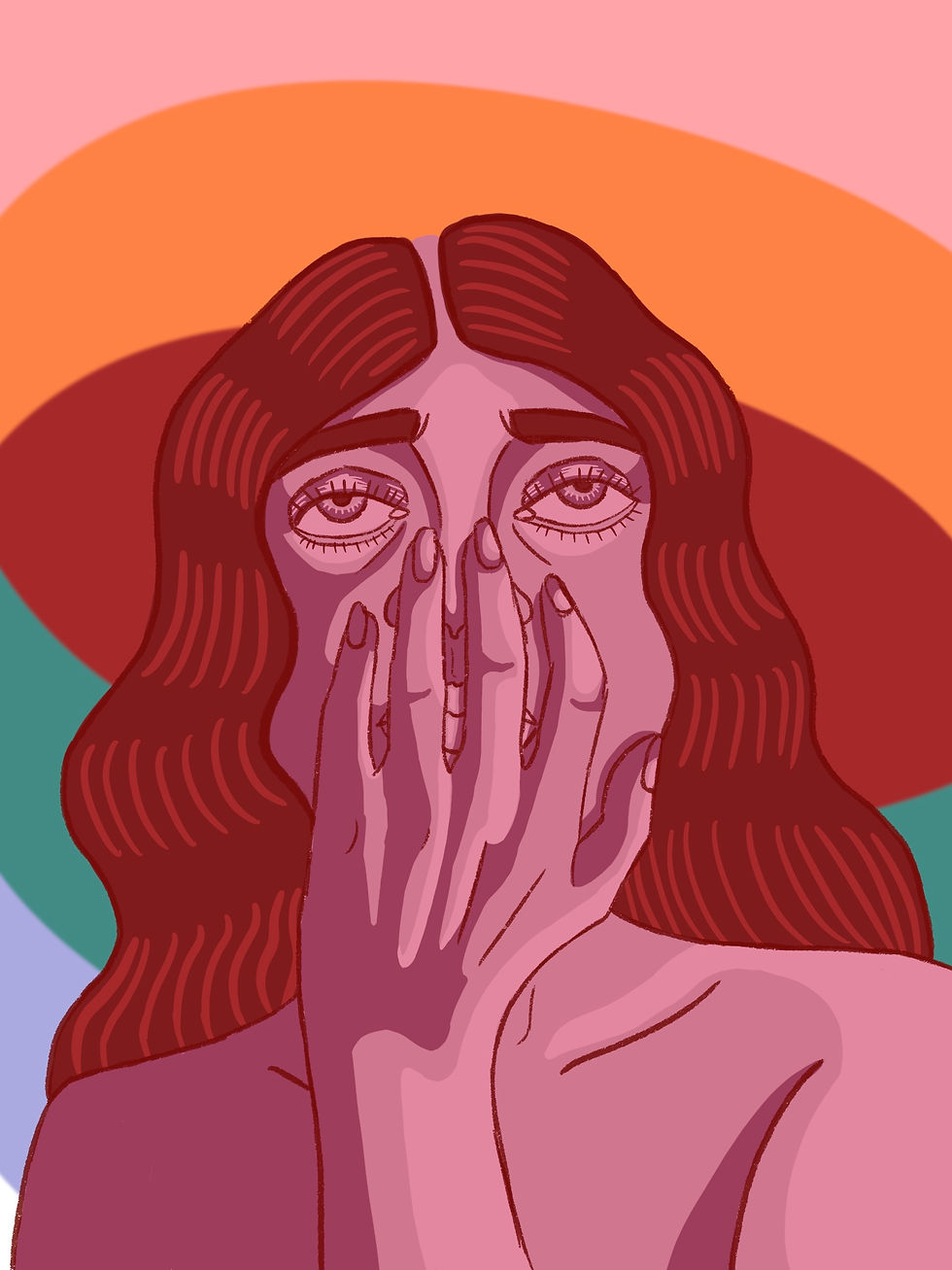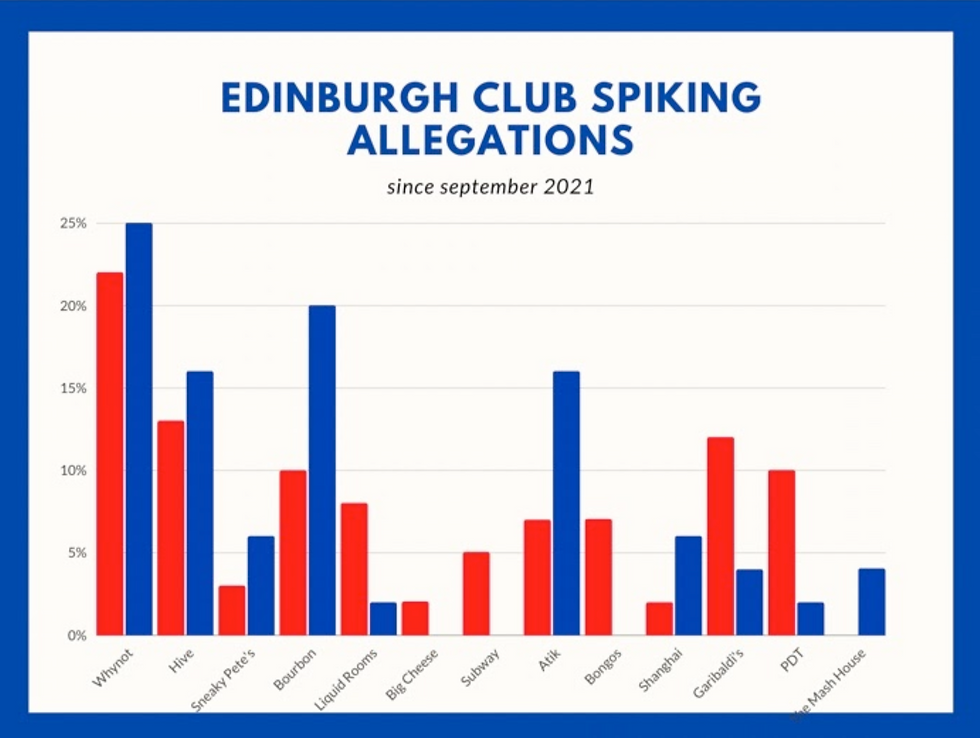With a rise in unprecedented 'spiked by injection' allegations surfacing across Edinburgh and nationwide, this article explores the allegations in detail, naming and shaming the Edinburgh nightclubs experiencing the highest percentages of allegations. Not only this, but an acknowledgement is also made for the significance of nightclub boycott campaign 'Girls Night In' and the systematic changes being demanded of the nightlife industry to keep individuals safe from the threat of spiking.

Image description: The image depicts a female figure with her hand covering her face. The figures' emotions are purposefully ambiguous in order for the viewer to project their own emotions onto it. Colour is used to invite the viewer to draw from their own experience and to recall a time where colour has affected them. The artwork's female figure expression encapsulates the shock, fright and desperation of women being targeted by the dangerous and life-threatening injection spiking across the United Kingdom.
Students are being encouraged to boycott Edinburgh’s nightclubs on the night of October 28th after numerous reports of spiking through both drink and injection at many different Edinburgh nightclub venues.
The boycott campaign, namely Girls Night In, was initially set up by University of Edinburgh students Milly Seaford and Martha Williams and has now been extended nationwide in an attempt to raise awareness for the growing number of of people reporting being ‘spiked by injection’, with a plethora of women posting pictures of small circular marks on their skin after suddenly falling seriously ill on a night out.
Accumulating over 6,000 Instagram followers in the space of a week, the movement has since experienced widespread support, encouraging people to host flat parties or other social events in safe environments to show that people ‘do not need nightclubs to have a good time at the risk of our own safety’. Speaking on the matter, a Girls Night In spokesperson passionately proclaimed that ‘spiking has become an epidemic’ and that ‘something must be changed’ to rectify this.
Such an epidemic is indeed one of great concern, with one anonymous Edinburgh student sharing that after only having a couple of drinks her body ‘suddenly went limp’ before she blacked out and was violently vomiting in the hours following. Insisting that she has always eased on the side of caution and taken the necessary measures to prevent the likelihood of such atrocity, she advocated for a move away from society’s victim-blaming approach towards spiking, stating that ‘you can do all of these measures and it can still happen to you’ and that ‘if somebody wants to spike you, they can spike you. It’s got nothing to do with what you do or don’t do’.
In the aftermath of her experience, she spoke strongly in favour of reporting any spiking incident to the police, insisting that the police had been ‘amazing’ in their aftercare and response. Nevertheless, a lot of frustration stems from the unfortunate fact that little seems to be being done to catch and prosecute these perpetrators, with only 4 offences prosecuted in the Scottish courts for ‘administering a substance for sexual purposes’ within the period of 2014-15 to 2018-19. It is rather unsurprising, therefore, that research conducted by SOS (Stamp Out Spiking) UK has found that a stark 98% of spiking victims do not go to the police.
Such widespread reports are statistically verifiable within the city of Edinburgh in particular, with a recent questionnaire conducted by the Instagram account Edinburgh Anonymous highlighting Whynot and Hive as the establishments experiencing the highest percentages of spiking allegations since September 2021.

This graph shows the % of spiking allegations (red) and % of sexual assault allegations (blue) at clubs in Edinburgh by answers offered from the general public to the Edinburgh Anonymous Instagram page. It is important to note that their pool of sources is only a small fraction of Edinburgh club-goers, so the numbers can be liable to change and are likely far higher than were estimated. Source: Edinburgh Anonymous.
In light of these allegations, a similar degree of frustration has been directed towards the nightlife industry’s poor handling of such incidents, with one anonymous Edinburgh student sharing that not only had a male bouncer ‘offered us pills’ but that, upon reporting, another male bouncer called them a ‘liar and threw us out’, with no follow-up or investigation conducted to verify the legitimacy of these claims. Likewise, several students have reported seeing bouncers re-admitting spiking perpetrators into clubs.
Michael Kill, CEO of the Night Time Industries Association, has commented ‘It goes without saying that everyone should be able to enjoy a night out without fearing for their own safety, and we are saddened to hear that some don’t feel this way’. To tackle this, he calls for the UK Home Office to ‘launch a formal inquiry’ to examine the results of Devon and Cornwall Police drink spiking testing pilot.
Girls Night In Edinburgh has likewise advocated for intrinsic changes within the nightlife industry, writing an open letter to all the nightclubs in Edinburgh urging them to listen to the significant number of safety concerns flagged by their followers. The letter also suggests several policies that could be introduced to help make clubbing safer, including providing training for staff and bouncers to reduce drug-related harm, the introduction of code words to enhance surveillance amongst staff, using safety coverings on drinks alongside more thorough checks at the entrances of clubs.
With a recent UK petition ‘to make it a legal requirement for nightclubs to thoroughly search guests on entry’ reaching 118,770 signatures (over the 100,000 required to be considered for a debate in Parliament), it is hoped that this movement, and the upcoming boycott, will generate the changes needed to keep individuals safe from the threat of spiking.
We would like to thank the Edinburgh student who bravely came forward to talk to us about her experience and the groups Edinburgh Anonymous and Girls Night In for their contribution.

Comments